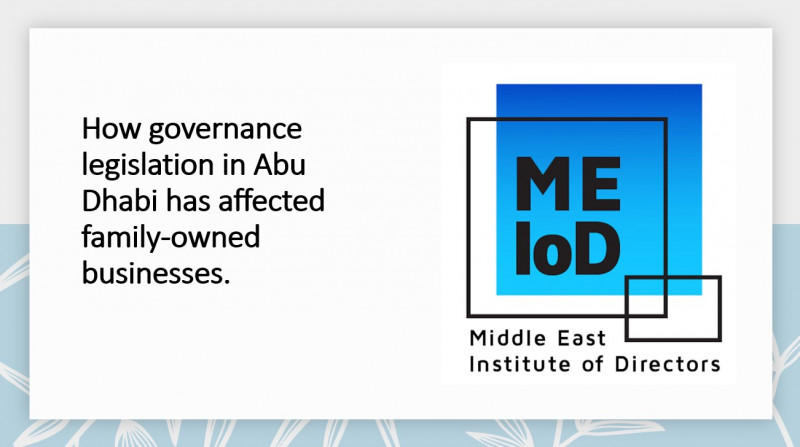How governance legislation in Abu Dhabi has affected family-owned businesses

How governance legislation in Abu Dhabi has affected family-owned businesses
In this article we look at the family business legislation enacted by Abu Dhabi at the beginning of 2022, and how it affects the management of such businesses within the Emirate.
In 2022, the President of Abu Dhabi, Sheikh Khalifa bin Zayed Al Nahyan, issued legislation aimed at increasing the contribution of family-owned businesses to growing and diversifying the country’s economy and adopting an economic model with greater flexibility on the one hand, and built-in sustainability on the other. This, it was expected, would bring family businesses in the region increasingly in line with global governance norms.
Key elements of the legislation
Abu Dhabi’s family business ownership law has given owners a number of new powers which allow them to protect the interests of the company in the present, and for succeeding generations. The four main areas affected by the legislation are:
- The ability to place restrictions on the sale of shares or distribution of dividends to individuals or entities outside the controlling family.
- A requirement that family partners must obtain consent prior to selling their stock to a non-family member.
- The ability to make available family-owned shares with weighted voting rights.
- A restriction on family-owned companies, preventing them from being pledged as encumbered assets, in order to prevent expropriation by third parties.
Who does this legislation apply to?
The new legislation was enacted on an “opt-in” basis, that is, owners, founders or co-founders of family businesses in Abu Dhabi can themselves request that the law is applied to cover their business.
Government guidelines advise such persons to submit a request to the Abu Dhabi Department of Economic Development (ADDED), following which ADDED will apply the executive and administrative regulations described within the law to their business from March this year.
Non-family members who own a 40% or greater share in a majority family-owned business are, however, exempt from the terms of the legislation.
Why was it necessary to codify this in law?
In Abu Dhabi, as in the Middle East in general, the family-owned business model is prevalent, and many of the leading companies in the country are family owned and controlled. As a result, the success of family business is closely tied to important economic factors such as overall employment, national wealth, and GDP.
While family businesses are successful, they can also be unstable, and in the case of large companies, this instability represents a risk from the point of view of the government. Issues such as intra-family disputes over ownership, strategy or direction can very quickly have a knock-on effect on the fortunes of the business—as we explored in this article.
The legislation aims to stabilize family businesses by providing a legal framework through which family members can confront and resolve the challenges they face, thereby limiting the ability of individual members to negatively affect the overall business.
What does this mean for family owned businesses in the wider GCC?
The dominance of the family-owned business model is similar across the other countries in the region, with family businesses contributing significantly to GDP and overall employment. It’s unsurprising therefore that governments are keen to ensure businesses of this type are regulated according to international standards of governance, and legislation is an obvious tool to achieve this.
Dubai, for example, has had a law governing family businesses in place since mid-2020, which similarly regulates ownership. Family members can enter into a collective ownership agreement, known as a Family Property Contract, which regulates the administration of the business and guarantees benefits relating to income and capital rights, both to current family members and their successors.
The contract can be customized to fit the needs of each individual business, and can include clauses to define the role of the board of directors in relation to the executive function, policies for hiring and removal of managers, and transfer of family members’ rights through inheritance. Dispute resolution is handled confidentially by a special judicial committee composed of legal and financial experts alongside specialist family management professionals, with the aim of minimizing the time taken to resolve any conflicts.
With Abu Dhabi having followed suit, it will be interesting to see what further legislation is introduced in the other countries across the region, as governments increasingly recognise the need to adapt traditional business models to comply with international standards in order to compete in an increasingly global business marketplace.
As always, MEIoD will keep you up-to-date with the latest developments relating to corporate governance, including those specifically affecting family-owned businesses, as they come to light.
In the meantime, if you have any questions about how the issues discussed in this article might affect your business, feel free to get in touch with one of our team and we’ll be happy to share our knowledge, or direct you to resources or training programs which could help.
For More Information:
advisoryServices | capacityBuilding | webinars | knowledgeCenter | A-Look-At-Corporate-Governance-In-The-Context-Of-COVID-19 | Is-it-acceptable-for-a-CEO-to-also-be-Chairperson | 5-ESG-trends-that-should-be-on-your-radar | Corporate-culture-and-the-role-of-the-board | What-does-it-take-to-excel-in-the-boardroom | The-key-drivers-of-effective-corporate-governance | Which-type-of-board-structure-does-my-business-need | The-Importance-of-a-Code-of-Ethics-in-an-Organization | reducing-the-pressure-to-decide-in-the-boardroom | How-future-proof-is-your-board | How-do-you-tell-if-someone-is-qualified-to-sit-in-the-boardroom | What’s-your-position--what’s-your-heading—leading-vs-lagging-indicators | The-value-of-governance-for-SMEs | Getting-started-with-governance:-a-guide-for-SMEs | What’s-on-the-boardroom-agenda-in-2021 | Role-of-CFO-in-the-boardroom | The-Shape-of-Corporate-Governance-in-2023 | Updates-on-Corporate-Governance-in-the-Middle-East-–-April-2023 | 3-ways-that-corporate-governance-is-crucial-to-sustaining-family-businesses | Boards-of-Directors-in-the-GCC:-Navigating-the-Aging-Boards-Issue | Board-Composition-Trends-in-GCC | Politics-in-the-Boardroom:-Navigating-Power-Dynamics-and-Decision-Making | Why-Startups-Need-Independent-Directors:-The-Key-to-Good-Governance-2 | The-role-of-the-chairperson-2 | How-board-remuneration-impacts-company-success-2 | The-value-of-a-family-constitution-for-family-owned-businesses-2 | 6-questions-board-members-should-be-asking-themselves-2 | Case-Study:-Lessons-from-a-Failed-Digital-Transformation-Implementation | 8-ways-boards-can-drive-effective-corporate-governance | How-committees-and-boards-interact-4 | Importance-of-Training-for-Directors | Advancing-Digital-Transformation-and-Cybersecurity-Governance-in-the-Middle-East | Strengthening-Stakeholder-Engagement-and-Communication-Across-the-GCC:-The-Critical-Role-of-Boards-in-Navigating-Shareholder-Activism | about | investors | director-nomination | corporate-governance-reporting | corporate-governance-assessment | 1-to-1-coaching-for-board-members | advisory-board-setup | board-evaluation | family | director-nomination | corporate-secretarial-services | corporate-governance-assessment | 1-to-1-coaching-for-board-members | board-evaluation | corporate-governance-reporting | individuals | director-nomination | 1-to-1-coaching-for-board-members | entrepreneurs | corporate-secretarial-services | corporate-governance-reporting | corporate-governance-assessment | 1-to-1-coaching-for-board-members | board-evaluation | advisory-board-setup | director-nomination
Share article




